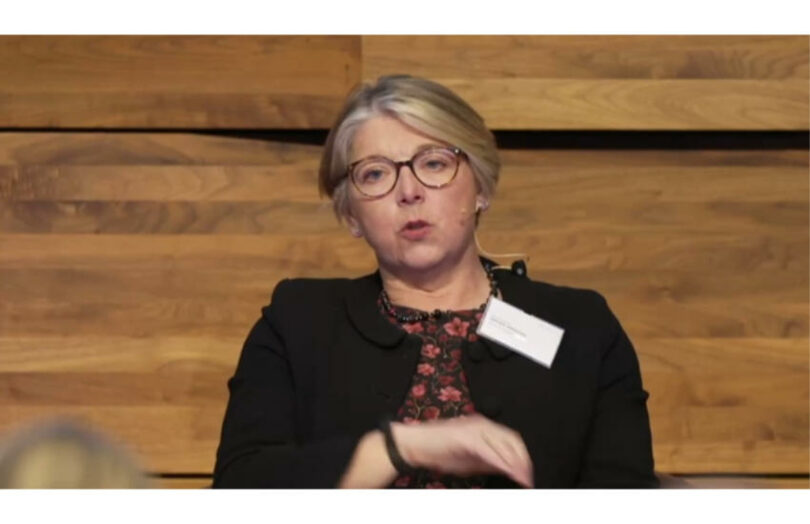During a recent event, the Bank of England’s Sarah Breeden emphasized that the future of tokenization has many potential outcomes, but both extremes of the bell curve feature incumbents failing to deliver. The Head of the BIS Innovation Hub, Cecilia Skingsley, had the opposite concern – will incumbents keep all the benefits to themselves or will they be passed on to consumers? The IMF’s Don He believes the global financial community has put significant effort into creating a coherent global network. Tokenization risks fragmenting that, even beyond geopolitics.
This might imply that they don’t see the benefits of tokenization. On the contrary, they demonstrated considerable optimism during an excellent Swiss National Bank panel. “My sense is that we may be on the cusp of widespread and more fundamental change (for payments),” said the Bank of England’s Deputy Governor Sarah Breeden.
The Bank of England & tokenization
Ms Breeden contemplates an array of potential tokenization outcomes.
“First is a stymied innovation option where efforts to integrate are slow or unsuccessful. Fragmentation crystallizes and we get costs of efficiency and risk management benefits being unrealized,” said Ms Breeden. That’s one end of the spectrum.
The other extreme is that tokenization is hugely successful or “unconstrained innovation.” However, incumbents are unable to deliver, allowing tokenization efforts to be led by newcomers, with innovation happening outside of existing frameworks. Deputy Governor Breeden doesn’t think this is likely, but it’s a scenario the bank needs to consider for contingency planning.
She also envisages two waves of tokenization benefits. The first leverages the efficiencies enabled by automation and atomic settlement. Ms Breeden noted that these changes “broadly preserve the current structure of payment and settlement.” Longer term, she sees it as more disruptive with post trade processes collapsing, removing layers of intermediaries.
While several central banks are experimenting with wholesale central bank digital currency (CBDC), instead the UK created central bank omnibus accounts for institutions. This supported the creation of Fnality, a private institutional form of tokenized money. To receive Fnality tokens, institutions transfer money to Fnality’s omnibus central bank account. Ms Breeden described this as simulated central bank money.
“I wanted to emphasize that it’s not the only game in town,” she said. The Bank of England is also exploring a ‘synchronized’ solution enabling the use of the real time gross settlement (RTGS) system as the payment leg for DLT transactions. This was the subject of last year’s Project Meridian with the BIS. Additionally, the bank is considering whether there’s a need for a wholesale CBDC or if the combination of RTGS synchronization and omnibus accounts is sufficient.
Ledger Insights Research has published a report on bank-issued stablecoins and tokenized deposits featuring more than 70 projects. Find out more here.
BIS Innovation Hub asks about confidence in tech
Meanwhile, Cecilia Skingsley, the Head of the BIS Innovation Hub, noted that much of the technology is new and untested. “How confident are you that they will actually work because we are upping the game now? We’re talking about really one of the fundamental keystones in society, the singleness of money. You can’t play around with that.”
Ms Breeden acknowledged that the (DLT) technology is unproven. “There are trilemmas all over the place in terms of security, speed and scalability. But what I am clear about is that it’s on us to be ready in case they are.”
Hyun Song Shin from the BIS said the technology has to be made to work and it comes down to design. Earlier in the panel he suggested that the BIS’ Project Agora for cross border payments didn’t need decentralized consensus. That’s because central banks want to have control.
Nonetheless, we’d observe that the private sector associates tokenization with distributed ledgers.
Dong He from the International Monetary Fund (IMF) said, “As long as central banks work closely with the private sector, we should have some confidence.” He echoed Ms Breeden in saying “I think that’s up to us.”
IMF worries about fragmentation
Dr. He is optimistic that tokenization can be a force for financial inclusion. The IMF believes it will be important for cross border payments, particularly for developing economies. Additionally, tokenization can also broaden access to capital markets for emerging economies.
However, as the IMF’s Deputy Director for Monetary and Capital Markets Department (MCM), Dr. He is concerned about fragmentation. While we often write about fragmentation relating to banks running their own blockchain islands to issue digital securities, Dr. He’s view is at a higher level – how different payment systems can be interoperable.
One type of system is the unified ledger concept promoted by the BIS. Another is mBridge, the common platform for cross border CBDC developed by four central banks with the BIS. Additionally, stand alone ledgers could be compatible with others. The key is interoperability.
Dr. He acknowledged the “very hard work put in by many central banks and authorities in the post war period that culminated in a very highly efficient, integrated, international monetary system.”
“We think independent of geopolitical developments …(which) … could lead to fragmentation, if we have failures in coordination, technological development itself might lead to fragmentation.”
He concluded, “How do we make sure that the international monetary system will continue to be highly integrated and at the same time efficient? That’s a big challenge.”






